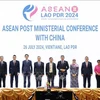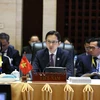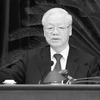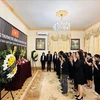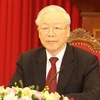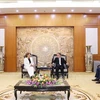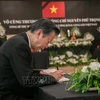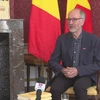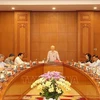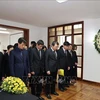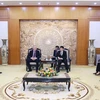Prime Minister Nguyen Tan Dung has appeared at the on-going 4 th session of the National Assembly on November 14 to address socio-economic concerns raised by NA deputies and voters.
At the Q&A session in Hanoi on November 14, Dung spoke of the country’s developing socio-economic situation and commented on monitoring and management requirements for the remaining months of this year.
He stated that at the beginning of the session, the Government reported the socio-economic situation in the first nine months, and forecasts for the whole year to the NA. In October and the first half of November, the economy continued to see positive developments with a slight CPI growth of 0.85 percent in October - much lower than that of the previous month - raising the ten-month figure to 6.02 percent.
According to the Government leader, in the first 10 months, budget revenue reached 76.2 percent while spending was 78.8 percent of estimates. Exports increased 18.4 percent and imports were up 6.8 percent. Payment balance continued to improve with stable foreign exchange rates and increased foreign currency reserves.
Industrial production in October rose by 5.8 percent compared to a 4.6 increase in September, while the total agro-forestry-fishery production value increased by 3.9 percent.
Rice exports for the whole year are expected to reach 7.5 million tonnes, the highest seen so far. Retail goods and service consumption increased 17.1 percent.
Foreign tourists to Vietnam numbered 5.35 million and are expected to hit 6.5 million by the end of the year - up 8.1 percent. The country generated jobs for close to 1.2 million labourers, fulfilling 80 percent of the yearly target.
The socio-cultural situation has continued to see fine development. Defence, security, social order and safety have been maintained, and foreign relations have gained positive results.
The above-mentioned outcomes have created more favourable conditions for the country to fulfill objectives and tasks that the Government reported to the NA at the beginning of the session, said the PM.
However, he noted that the country still faces many challenges in the context of domestic and global difficulties.
The world economy is vulnerable with numerous hidden risks. The recent G20 meeting of developed and emerging economies presented negative assessments of the global economy in 2013, saying that recent economic stimulus measures are not strong enough to help the world economy escape from the slowdown. Bad debt remains a threat to the economic growth of not only the EU, but also Japan and the US , which could push the world economy into further difficulties.
The domestic macro economy and inflation-curbing work are yet maintainable. Production and business still face difficulties. Overall demand has reduced, while inventories and bad debt have stayed high, he said, adding that if the situation is not improved, the economy will become sluggish, negatively affecting jobs and living conditions of the population.
Regarding issues related to society, culture, national defence and security and external relations, Dung said there still remain problems that must receive more attention if they are to be solved. He cited the recent flood that caused disastrous losses in several northern coastal provinces.
The Prime Minister stressed that the government will promptly and firmly implement the tasks and measures stated in the National Assembly Resolution on the Socio-economic Development Plan for 2013. At the same time, it will continue applying measures to strengthen the micro economy, reining in inflation, while removing barriers for businesses to foster production, job creation and growth.
The government will create practical and detailed plans of action, while strengthening regulations, focusing on responsibilities of leaders in the implementation process.
It will actively implement awareness work and create consensus and determination to carry out the tasks in 2013.
Accordingly, the government will focus on the following tasks.
Firstly, it will solve inventories, settle bad debt and remove barriers for enterprises - stepping up the development of production and business.
Large inventories and bad debt are considered as knots in the economy.
To manage inventories, PM Dung said it is necessary to increase the total demand of the economy, allow businesses to expand in their markets, and reduce production costs, thus creating favourable conditions for businesses to cut prices and sell more goods.
All the said three solution groups need financial resource, and this requires measures to prevent loss of revenue to be strengthened while thrift must be strictly practiced. The Government will set tighter regulations on the spending from the 2013 State Budget, he added.
On the issue of bad debt, Dung noted that the situation in credit organisations has worsened rapidly since the 2nd half of 2011. According to the State Bank of Vietnam (SBV), bad debt accounted for 8.82 percent of the economy’s total credit - equal to about 250 trillion VND.
Dealing with bad debt is an urgent matter and needs to be implemented with a multitude of measures, including selling off inventories and supporting business operations.
International experiences show that the State plays an important role in solving bad debt. The Government has asked the SBV to work with the Ministry of Finance to work out a plan to establish a debt trading company and issue legal documents to function as a basis to manage bad debt.
The country strives to reduce the bad debt level to about 3-4 percent by the end of 2015, the Government leader said.
As for difficulties in the real estate market, the Prime Minister instructed the Ministry of Construction, the SBV, the Ministry of Natural Resources and Environment and the Ministry of Finance to coordinate with localities to develop solutions to deal with the challenging market.
The government will also continue the implementation of a legal system on urban management, property, and business and tax policies to reduce property speculation.
Measures to solve bad debt, inventories and obstacles in the real estate market need to be implemented at the same time. The government considers it an impending key task.
Regarding economic restructuring, the government has composed a master plan on economic restructuring in combination with improved quality, effectiveness and competitiveness.
Since 2012, it has focused on restructuring investment (especially public investment), restructuring State-owned enterprises (chiefly economic corporations and groups), and restructuring credit organisations.
In terms of investment restructuring, Vietnam has applied many measures that initially achieved positive results. The government will carry on with their plan for a complete legal system on investment, and suggest the National Assembly amend the Law on State Budget and issue the Law on Public Investment, Dung said.
On the restructuring of State companies, the Prime Minister in July 2012 approved the Proposal of Restructuring State-owned Enterprises, with focus placed on State-owned economic groups, corporations and businesses. In order to strictly implement the Conclusion of the 6 th meeting of the Party Central Committee on continuing rearranging, renovating and enhancing efficiency of the State-owned enterprises, the Government is conducting the following tasks:
Enterprise classification reviews to realign State capital, adjusting the structure of State-owned enterprises, with a focus on key sectors, important localities, providers of essential products and services, basic industries and high-tech-intensive sectors.
Arranging and equitising enterprises in line with the approved plan and implementing the state divestment process in joint stock companies outside the government’s control.
Reorganising State-owned enterprise models, applying advanced administration and transparency in all activities of State-owned enterprises in criteria of listed companies.
Placing State-owned enterprises in an equal and competitive environment with a variety of other business types.
Applying the mechanisms of State orders and market-based book-keeping to enterprises that assist macro regulations and implement social welfare.
On the issue of restructuring credit agencies, the Prime Minister approved the Proposal on Restructuring Credit Institutions with a concrete roadmap to achieve a goal of establishing a system of credit organs that are characterised by diversity of ownership, scales, models, safe and effective performance and competitiveness with market-driven operation, and in accordance with international principles and standards. In the 2011-2015 period, there will be emphasis on a healthy financial performance, enhanced capacity, and improved safety and efficiency of credit organisation operations.
The Government will continue to develop the management criteria that credit organisations operate to meet international standards, improve inspection and supervision of their operations, and punish any illegal acts to ensure the safety of the system.
At the session, NA deputies sent with 247 questions to the Prime Minister and Cabinet members - 11 questions were directed at the PM.
In the past two days, Deputy PM Nguyen Xuan Phuc, Deputy PM Nguyen Thien Nhan and seven ministers participated in the question-and-answer session.-VNA
At the Q&A session in Hanoi on November 14, Dung spoke of the country’s developing socio-economic situation and commented on monitoring and management requirements for the remaining months of this year.
He stated that at the beginning of the session, the Government reported the socio-economic situation in the first nine months, and forecasts for the whole year to the NA. In October and the first half of November, the economy continued to see positive developments with a slight CPI growth of 0.85 percent in October - much lower than that of the previous month - raising the ten-month figure to 6.02 percent.
According to the Government leader, in the first 10 months, budget revenue reached 76.2 percent while spending was 78.8 percent of estimates. Exports increased 18.4 percent and imports were up 6.8 percent. Payment balance continued to improve with stable foreign exchange rates and increased foreign currency reserves.
Industrial production in October rose by 5.8 percent compared to a 4.6 increase in September, while the total agro-forestry-fishery production value increased by 3.9 percent.
Rice exports for the whole year are expected to reach 7.5 million tonnes, the highest seen so far. Retail goods and service consumption increased 17.1 percent.
Foreign tourists to Vietnam numbered 5.35 million and are expected to hit 6.5 million by the end of the year - up 8.1 percent. The country generated jobs for close to 1.2 million labourers, fulfilling 80 percent of the yearly target.
The socio-cultural situation has continued to see fine development. Defence, security, social order and safety have been maintained, and foreign relations have gained positive results.
The above-mentioned outcomes have created more favourable conditions for the country to fulfill objectives and tasks that the Government reported to the NA at the beginning of the session, said the PM.
However, he noted that the country still faces many challenges in the context of domestic and global difficulties.
The world economy is vulnerable with numerous hidden risks. The recent G20 meeting of developed and emerging economies presented negative assessments of the global economy in 2013, saying that recent economic stimulus measures are not strong enough to help the world economy escape from the slowdown. Bad debt remains a threat to the economic growth of not only the EU, but also Japan and the US , which could push the world economy into further difficulties.
The domestic macro economy and inflation-curbing work are yet maintainable. Production and business still face difficulties. Overall demand has reduced, while inventories and bad debt have stayed high, he said, adding that if the situation is not improved, the economy will become sluggish, negatively affecting jobs and living conditions of the population.
Regarding issues related to society, culture, national defence and security and external relations, Dung said there still remain problems that must receive more attention if they are to be solved. He cited the recent flood that caused disastrous losses in several northern coastal provinces.
The Prime Minister stressed that the government will promptly and firmly implement the tasks and measures stated in the National Assembly Resolution on the Socio-economic Development Plan for 2013. At the same time, it will continue applying measures to strengthen the micro economy, reining in inflation, while removing barriers for businesses to foster production, job creation and growth.
The government will create practical and detailed plans of action, while strengthening regulations, focusing on responsibilities of leaders in the implementation process.
It will actively implement awareness work and create consensus and determination to carry out the tasks in 2013.
Accordingly, the government will focus on the following tasks.
Firstly, it will solve inventories, settle bad debt and remove barriers for enterprises - stepping up the development of production and business.
Large inventories and bad debt are considered as knots in the economy.
To manage inventories, PM Dung said it is necessary to increase the total demand of the economy, allow businesses to expand in their markets, and reduce production costs, thus creating favourable conditions for businesses to cut prices and sell more goods.
All the said three solution groups need financial resource, and this requires measures to prevent loss of revenue to be strengthened while thrift must be strictly practiced. The Government will set tighter regulations on the spending from the 2013 State Budget, he added.
On the issue of bad debt, Dung noted that the situation in credit organisations has worsened rapidly since the 2nd half of 2011. According to the State Bank of Vietnam (SBV), bad debt accounted for 8.82 percent of the economy’s total credit - equal to about 250 trillion VND.
Dealing with bad debt is an urgent matter and needs to be implemented with a multitude of measures, including selling off inventories and supporting business operations.
International experiences show that the State plays an important role in solving bad debt. The Government has asked the SBV to work with the Ministry of Finance to work out a plan to establish a debt trading company and issue legal documents to function as a basis to manage bad debt.
The country strives to reduce the bad debt level to about 3-4 percent by the end of 2015, the Government leader said.
As for difficulties in the real estate market, the Prime Minister instructed the Ministry of Construction, the SBV, the Ministry of Natural Resources and Environment and the Ministry of Finance to coordinate with localities to develop solutions to deal with the challenging market.
The government will also continue the implementation of a legal system on urban management, property, and business and tax policies to reduce property speculation.
Measures to solve bad debt, inventories and obstacles in the real estate market need to be implemented at the same time. The government considers it an impending key task.
Regarding economic restructuring, the government has composed a master plan on economic restructuring in combination with improved quality, effectiveness and competitiveness.
Since 2012, it has focused on restructuring investment (especially public investment), restructuring State-owned enterprises (chiefly economic corporations and groups), and restructuring credit organisations.
In terms of investment restructuring, Vietnam has applied many measures that initially achieved positive results. The government will carry on with their plan for a complete legal system on investment, and suggest the National Assembly amend the Law on State Budget and issue the Law on Public Investment, Dung said.
On the restructuring of State companies, the Prime Minister in July 2012 approved the Proposal of Restructuring State-owned Enterprises, with focus placed on State-owned economic groups, corporations and businesses. In order to strictly implement the Conclusion of the 6 th meeting of the Party Central Committee on continuing rearranging, renovating and enhancing efficiency of the State-owned enterprises, the Government is conducting the following tasks:
Enterprise classification reviews to realign State capital, adjusting the structure of State-owned enterprises, with a focus on key sectors, important localities, providers of essential products and services, basic industries and high-tech-intensive sectors.
Arranging and equitising enterprises in line with the approved plan and implementing the state divestment process in joint stock companies outside the government’s control.
Reorganising State-owned enterprise models, applying advanced administration and transparency in all activities of State-owned enterprises in criteria of listed companies.
Placing State-owned enterprises in an equal and competitive environment with a variety of other business types.
Applying the mechanisms of State orders and market-based book-keeping to enterprises that assist macro regulations and implement social welfare.
On the issue of restructuring credit agencies, the Prime Minister approved the Proposal on Restructuring Credit Institutions with a concrete roadmap to achieve a goal of establishing a system of credit organs that are characterised by diversity of ownership, scales, models, safe and effective performance and competitiveness with market-driven operation, and in accordance with international principles and standards. In the 2011-2015 period, there will be emphasis on a healthy financial performance, enhanced capacity, and improved safety and efficiency of credit organisation operations.
The Government will continue to develop the management criteria that credit organisations operate to meet international standards, improve inspection and supervision of their operations, and punish any illegal acts to ensure the safety of the system.
At the session, NA deputies sent with 247 questions to the Prime Minister and Cabinet members - 11 questions were directed at the PM.
In the past two days, Deputy PM Nguyen Xuan Phuc, Deputy PM Nguyen Thien Nhan and seven ministers participated in the question-and-answer session.-VNA
